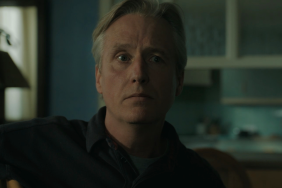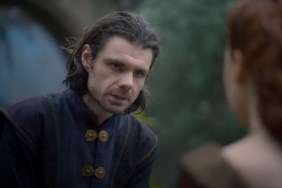
Interview with Sicario director Denis Villeneuve
A few years ago, Canadian filmmaker Denis Villeneuve was barely known by the public at large, even after his stirring drama Incendies received an Oscar nomination in the Foreign Language category.
That changed in 2013, when Villeneuve directed his first studio film, the thriller Prisoners, starring Hugh Jackman and Jake Gyllenhaal, and Villeneuve started to get noticed in Hollywood to the point where he’s been working almost non-stop in the last couple of years with his latest film Sicario having premiered at the Cannes Film Festival back in May.
Sicario looks at the government’s war on drugs, particularly the Mexican drug cartels based in Juarez, Mexico with Emily Blunt playing Kate Macer, a tough by-the-books FBI agent, who is recruited into a DEA task force trying to take down one of Mexico’s most notorious drug kingpins. Once on board, Kate learns there’s more to the motives of her handler Matt Graver (Josh Brolin) and the mysterious Alejandro (Benicio Del Toro), who seems to have more of a knowledge and connection to the drug trade than he’s letting on.
The movie has more action than we’ve seen from Villeneuve in his previous films, but he handles those scenes as well as he’s been able to do with the dramatic moments in his previous thrillers.
Having spoken to Villeneuve a number of times before, ComingSoon.net had another chance to sit down with him at the Toronto International Film Festival a few weeks back, specifically to talk about Sicario, but he also spoke briefly about his next movie, Story of Your Life (Arrival), starring Amy Adams, which is already in post-production. He couldn’t say as much about another project he’s attached to direct, the long-awaited Blade Runner sequel.
ComingSoon.net: I guess “Sicario” is Taylor Sheridan’s first screenplay and he’s mainly an actor, so how did his script get to you?
Denis Villeneuve: The truth is that I received a phone call from my agent one night saying, “Denis, I read something. It is for you. It is exactly the kind of movie that you want, the political thriller that you are looking for. You must read that screenplay.” I never heard him talking to me like that. I receive tons of screenplays on a daily basis, but that one, it really struck me because I felt that it was a very powerful, dark poem about the Mexican border, and it was saying a lot of things about our world today that were pretty accurate, raising a lot of questions. The thing that I love, also, was that it was not bringing answers, it was more raising questions about, “How can we deal with the problems outside of our borders? Do we need to become monsters like the monsters in order to stop violence?” It’s something that I felt was very accurate questions for the world today.

CS: Being Canadian is a little bit different, because while you have borders, the only time you have to worry about invaders is during the film festival.
Villeneuve: [Laughs] Exactly. No, Canadians, we are spoiled. The only thing that’s violent in our country is the winter. The winter is very rough here, but the rest. No, it’s true. Usually, that kind of violence, that kind of darkness, we see that in Africa or we see that in the Middle East, but it’s just… we can throw a Frisbee into Juarez. It’s just so close to the United States–at the doorstep, and it’s so close. I felt it’s a very striking thing, that in the world, there’s less and less middle class. The world in a way, it seems to become more and more extreme, and that border is saying a lot of things about the world of our near future, I think.
CS: Was it also interesting to have a female lead? That was always the case I assume.
Villeneuve: My two first movies were with a female lead when I was a screenwriter, and I was saying to myself that it was probably to have a distance with the men, with the subject. I realized at one point it was not true, it was more that I was just simply moved by the female condition, the way women in the world today still are struggling with power and their place in society. There’s a lot to be said. There’s a lot of filmmakers, and I think there’s a lot of great stories that need to be said about women, and I feel that there’s not a lot of good parts. Most of the time, they are supporting roles, you know? They are there to be the wife or the girlfriend or the beautiful woman at the bar. I think it’s evolving. I think they are getting there, but I like to consider myself, in a way, a feminist director. I don’t know if I can say that, being a man, but I like to think that I love women. I deeply love women. I love the feminine quality.
CS: Had you seen Emily Blunt in something that made you think of her casting her for the role of Kate?
Villeneuve: “The Young Victoria.” Yeah, I remember it, because I felt that in “The Young Victoria,” she had that kind of inner strength. She was playing a young, vulnerable lady that needed to be brought to the throne of England at a young age. I felt when she was playing that kind of naivete and innocence, I think she still had that kind of inner strength inside of her. To portray a woman that would be able to lead a SWAT team, there’s not a lot of actresses that I can believe. I didn’t want the audience to see a movie star acting as a cop. I wanted to have a cop in front of the camera, and I know that Emily will have the strength and the ability, the physicality to do that.
CS: What about finding the locations? Did you actually shoot in Juarez at all?
Villeneuve: Most of the movie was shot in New Mexico for different reasons. I was very pleased with that because for me, New Mexico is almost a country. It has a very specific culture, a very specific landscape, a very inspiring place. We shot also in Texas, El Paso, and we shot a bit in Juarez, but honestly, from above, because it was not possible to shoot inside on the ground in Juarez. It was not possible for me to bring a film crew there. We shot in Mexico City a lot, as well.

CS: You assembled a great team for “Prisoners,” and you brought many of them over for “Sicario,” including Roger Deakins and composer Johann Johannsson, but made a movie that looks and feels completely different.
Villeneuve: Yeah, but when I read “Sicario,” the first thing I said to myself instantly is, “I need to do that with Roger.” For me, it was because the level of complexity visually what I was looking for, I was saying to myself, “It’s a Deakins movie.” There’s another project that I did or that I will do in my life that I will not say that, but for “Sicario,” Roger brought a lot of strength to the project. I’m very grateful and I feel so spoiled.
CS: I was going to say that when you worked with Roger the first time, you must’ve felt really spoiled. How do you work with another cinematographer after working with him?
Villeneuve: For the first time, I was working with him, I am not someone that is easily starstruck, but at the beginning, when I was doing “Prisoners,” at one point, I had to come back to, “Okay, I am the director. I must direct Roger Deakins.” I had to pinch myself at the beginning, and now, I am past that phase. But honestly, that’s the beauty of doing movies outside of home, to go abroad, to work with artists from other countries. Sometime, it’s like you have the chance to work with masters, and that, for me is the biggest gift. When people are asking me, “What is the biggest thing about making movies in the United States?” it’s to have the chance to work with those artists. It’s massive fun.
CS: Earlier you said, “when I was a screenwriter,” so do you feel like now you’ve moved on to just directing and won’t write screenplays for yourself anymore?
Villeneuve: The thing is that when you are a director, you need to be involved in a lot of different fields. You must be a psychologist, an architecture expert, you must be a choreographer. You understand what I mean? I feel that one of the fields that I need to learn a lot is screenwriting. I used to write my own screenplays, but it’s just that I remember that at that time, I was saying to myself, “I wish one day I will meet a screenwriter that will help me because I feel that I need to learn.” I need that there (because) I’m slow. So when I’m reading screenplays, coming out of L.A. sometimes–“Sicario” is a good example–I feel right now that I’m reading strong screenplays written by guys that are better screenwriters than me, and what I know is that I can help them. I can help them to improve the screenplay, but they are better screenwriters. Taylor Sheridan, he has skills that I don’t have, so I have to be humble, and it’s very exciting. Filmmaking is teamwork, so as long as I will find a great script written by others, I think I’d rather direct.
CS: When you do a movie like this, how involved do you want Taylor the screenwriter to be while you’re making the movie? Do you immediately call Taylor up and say, “Okay, I’m going to direct this movie. Let’s sit down and let’s work on it”?
Villeneuve: Let’s say that the “Sicario” screenplay was quite achieved when I read it. I met him and there were some things that I wanted to improve and some adjustments, and there’s some of them that were in prep with Taylor, and some others that were done on the set with actors. Even with my own screenplays, I give myself the liberty, at the end of the day, the words are there to inspire yourself, but at the end of the day, the images rule, you know? The camera is the dictator. So I said to Taylor at the beginning of the process, “You know what? I’m going to be your best friend, because I will really try to protect your poetry and your universe. I am going to be your worst enemy also, because I am going to be a traitor, because sometime I’m going to remove lines, I will change things. ‘Sicario’ will become mine and you will hate me for that sometime, but it will be done because I love it.” So “Sicario” is my movie, but it all came from Taylor’s inspiration and great ideas, and I am grateful. For me, it’s important to recognize all the time that “Sicario” was written by Taylor. It’s his movie, too, but it’s a combination. You understand what I mean?

CS: Absolutely. Without spoiling things, I want to talk about one of the pivotal scenes when Kate meets a guy at a bar and something happens, and the film then switches more towards Benicio’s character. I think for some people it’s going to be very difficult to watch that scene because it gets very dark at that point. Was that scene in the original script?
Villeneuve: It was not. That’s a good example, actually, because it’s a scene that for different reasons, budget reasons, the bar sequence was bigger in some ways, and we didn’t have to make decisions. I had to choose where I will put that money, and as a director, you have to deal with economic problems, and sometimes, that’s why I said, “At this moment, I will make it more intimate in the bar than it was written,” and it was very beautiful in the screenplay, but I had to make it. Then Jon Bernthal is a very strong actor and I really loved this exploration of intimacy and violence, how it came from an intimate moment with a hugely violent moment. It’s like that switch in a very short period of time. For me, it was a beautiful challenge to explore.
CS: It kind of harkened back to some of the things you explored in “Incendies,” too.
Villeneuve: Yeah, yeah, I understand.
CS: You’ve actually shot another movie since finishing “Sicario”?
Villeneuve: I shot a movie this summer called “Story of Your Life” with Amy Adams and Jeremy Renner and Forest Whitaker. It’s a sci-fi movie, a story of a linguist that is hired by the U.S. government to get in contact with the alien civilization. It’s (about) a spaceship that landed in different places in the world and nothing is happening and everybody is looking and she had to go and get contact. It’s a movie about language. Totally different. After “Prisoners” and “Sicario,” I needed to get out of the dark a bit, just to go a bit a more lighter space for at least one year.
CS: I’m interested in your choice to do genre films, because you did “Prisoners” and “Enemy,” which were both thrillers and then “Sicario” is more of an action movie in some ways. And now you’re doing science fiction, which is also genre. You’ve been leaning more towards genre than drama.
Villeneuve: It’s strange, because I understand that each genre has its own specific rules, but for me, they are all movies. I’m just attracted to try to do different things, and I was very excited to make a movie that required more action. I was raised with James Bond. I love James Bond movies. I would love to do a James Bond movie one day. Action is very cinematic. I’m not someone that loves dialogue – I am someone that loves movement. Action, if it’s well done, can be very poetic and meaningful.
CS: I probably have a thousand questions about “Blade Runner,” and I’m really curious about that but I guess we’ll have time to talk about that later.
Villeneuve: Yeah, you can guess that the answers are very boring right now.
CS: I just saw Ridley Scott yesterday for “The Martian” and I didn’t get a chance to talk to him about it either. Have you talked to him yet?
Villeneuve: I met him, but I didn’t have the chance to meet him here. We’re both busy.
Sicario is now playing in select cities, but it will expand nationwide on Friday, October 2. You can watch our previous interview with Benicio Del Toro here and look for video interviews with Emily Blunt and Josh Brolin very soon.
Sicario
-
Sicario

-
Sicario

-
Sicario

-
Sicario

-
Sicario

SICARIODay 01
-
Sicario

S_D18_05049.NEF
-
Sicario

S_D028_11555.NEF
-
Sicario

-
Sicario

-
Sicario

-
Sicario

-
Sicario

-
Sicario

-
Sicario

-
Sicario

-
Sicario

-
Sicario

-
Sicario

-
Sicario

-
Sicario

-
Sicario

-
Sicario

-
Sicario

-
Sicario









